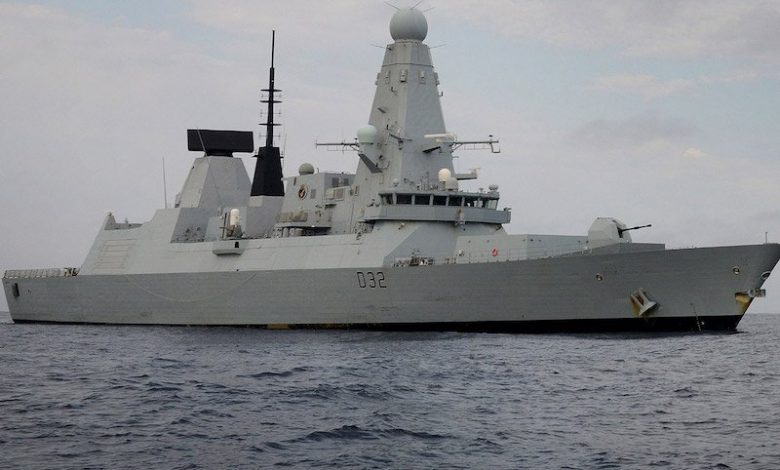UK navy decision to deploy its most advanced warship off Yemen questioned

Growing fears of terror attacks on a crucial waterway of world shipping has seen the UK deploy its most advanced warship off the coast of Yemen.
With a Teekay LNG carrier and a number of naval ships coming under attack in recent weeks and concern growing that terrorists are planning more suicide attempts in the narrow Bab al-Mandeb Strait, the HMS Daring has been sent to help commercial ships transit the area, the UK’s Times newspaper reports.
The strait links the Red Sea with the Gulf of Aden.
Kevin Doherty from Nexus Consulting questioned the UK navy’s decision, suggesting it could lead to a replay of the so-called Tanker Wars of the 1980s.
“It’s a potentially dangerous move by the UK adding a warship to the area of operation,” Doherty said.
“It’s eerily reminiscent of the beginning of Operation Earnest Will aka the Tanker Wars of the 1980s in the Persian Gulf.”
Doherty warned that there is a significant risk to all ships around Yemen from rockets, and that risk seems to be indiscriminate, being fired at any ship of opportunity.
“Adding a warship certainly increases the potential for collateral/compounded damage,” Doherty said.
In the Tanker Wars, a number of US warships sustained significant damages, including the USS Stark (fired upon by ‘friendly’ Iraqi aircraft) and the USS Samuel B. Roberts, which almost sank.
“As the rocket attacks on ships around Yemen neither appear to be targeted nor fired from fixed positions there seems little a warship can do to prevent these attacks, and ultimately adds one more ship as a potential target,” Doherty concluded.

As DPA/CSo for a shipping company I am very surprised by the comments expressed in this article. I would have thought that the presence of additional naval units in the HRA/Bab al-Mandeb area would be a positive thing for the merchant seamen who operate through that zone. If we extend the logic on an extra vessel meaning an extra target, then we should, logically, remove all naval units to reduce the potential risk. Really?
An extra warship in the Gulf/Yemen/Saudi conflict area? Fair enough; the only problem which I, along with many others with very close connections to both Merchant and Royal Navy vessels is that the ‘most advanced White Ensign destroyer’ has an unfortunate habit of breaking down at the most inopportune moments. Something to do with the ‘advanced gas-turbine/propulsion system’s proven habit of breaking down really, really regularly; and the cheeseparing M.O.D.’s habit of not fitting back-up systems to ‘save money’!
I agree with Ian and with Mike.
The Royal Navy are doing what we British taxpayers pay them to do.
Good day Ian C,
Thanks for the comment and I understand your point, however, the risk to commercial shipping at this point isn’t a “close in” risk (boarding, water-borne bomb along side..), or more specifically, it isn’t a waterborne threat/ risk.
The risk comes from the land and unfortunately is extending into the sea.
I’m sure you’re well versed in SSP/VSP’, and risk analysis, and under a risk-mitigation model, a naval vessel doesn’t mitigate a land-threat. If it were a port issue, and the vessel was conducting security operations, that would be one thing, but merely escorting commercial ships around Yemen really doesn’t provide either a deterance or mitigation to the threat of rockets.
If anything, it very well many increase the threat. I’m sure you’ve got some former infantry folks working on your fleet, and if you asked them to describe a tank, armored carrier, on helicopter, most would say “bullet magnet.” That’s the same logic here – maybe even more so, because a naval vessel is a prime target for the rebels, where as hitting a civilian ship would be counter-productive due to non-combatant loss of life.
If a security measure does not reduce or stop a threat or risk, of what use is it? Certainly the argument can be made for deterance via a show of force, but from an analytical, empirically-based assessment, for preventing a rocket attack off Yemen, naval vessels are far more a bullet-magnet than a silver-bullet.
Surely aiding safe oil passage (predominantly Iranian) via the gulf of Aden and the Red sea, from a political stance, would be counter-productive?
Interesting article;
https://www.theguardian.com/uk-news/2016/jun/07/destroyers-will-break-down-if-sent-to-middle-east-admits-royal-navy
I’m curious over how many vessels in the task force have been attacked so far? It seems strange that there is no evidence of this in the public domain yet one additional vessel will substantially increase the risk.
I actually see nothing but benefits from an increased military presence in the area. Opportunities for targeting of merchant vessels will decrease.